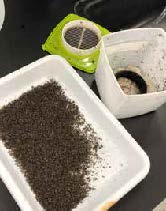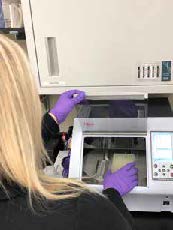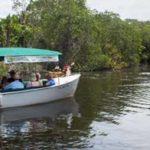Patrick Linn Executive Director CMCD discusses Infection Detection

by By Patrick Linn, MS, MSHAPI Executive Director, Collier Mosquito Control District
In September 2019, Palm Beach County saw its first-ever case of locally acquired dengue fever. At the same time, Miami-Dade County confirmed a fourth case of someone who had contracted the disease from a local mosquito. Typically seen in Asia and the Tropics, the incidence of this disease has grown dramatically in recent decades. Does that mean we should be concerned about the potential for dengue in Collier County? Absolutely. Dengue is
transmitted by the bite of an infected female Aedes aegypti mosquito – a species found in abundance here.
Safeguarding our community from mosquito-borne disease is the Collier Mosquito Control District’s primary mission, and the Aedes is monitored closely because it’s capable of vectoring not only dengue, but also Zika, chikungunya, and yellow fever. Of the 42 species found in our area, the Aedes is one of three of concern.
The public health concern with this species is that if a traveler returns to Collier County infected with one of these illnesses, it presents the Aedes with the potential to spread the disease from person to person. She simply takes blood from an infected human, drawing some of the virus into her salivary glands. The next person she bites receives the virus from her. Since the Aedes feeds primarily on humans and prefers to breed in man-made containers of standing water around homes, she has the potential to quickly spread disease.

Thousands of mosquitoes are brought into the
District’s lab each week from area traps.
To monitor the threat of disease from local mosquitoes, including the Aedes, the District traps thousands of mosquitoes weekly in a variety of traps located throughout the community. The traps are brought into our labs each week where our scientists separate the mosquitoes by species, then tests them for the diseases they can vector. Results are available by the end of the day.
If we discover evidence of disease in the mosquitoes, we confirm the location of the trap they were in and launch an aggressive integrated mosquito management program in that area. This includes going door-to-door with educational materials for residents and implementing immediate (and repeated) treatments, targeting both mosquito larvae and adults. Throughout the process, trapping and testing of mosquitoes from the area would continue daily in our lab until we determine the virus has been eliminated.

The District’s scientists use specialized equipment in our lab
to determine if local mosquitoes are carrying disease.
Because mosquitoes are year round in Southwest Florida, we constantly advise our residents to be vigilant in the “5 Ds” of mosquito protection. Defend yourself by wearing repellents, avoid being out at Dawn and Dusk when mosquitoes are most active, Dress in loose long-sleeve shirts and pants when reasonable, and Drain any containers of standing water on your property.
 To learn more about the District’s operations, public tours are available. Included are presentations by our research team in the laboratory, our operations/surveillance team, and a visit to the hangar. We also make arrangements for staff to conduct presentations at group meetings. Please call our office at (239) 436-1000 to schedule a tour or if we can provide more information.
To learn more about the District’s operations, public tours are available. Included are presentations by our research team in the laboratory, our operations/surveillance team, and a visit to the hangar. We also make arrangements for staff to conduct presentations at group meetings. Please call our office at (239) 436-1000 to schedule a tour or if we can provide more information.



Leave a Reply
Want to join the discussion?Feel free to contribute!